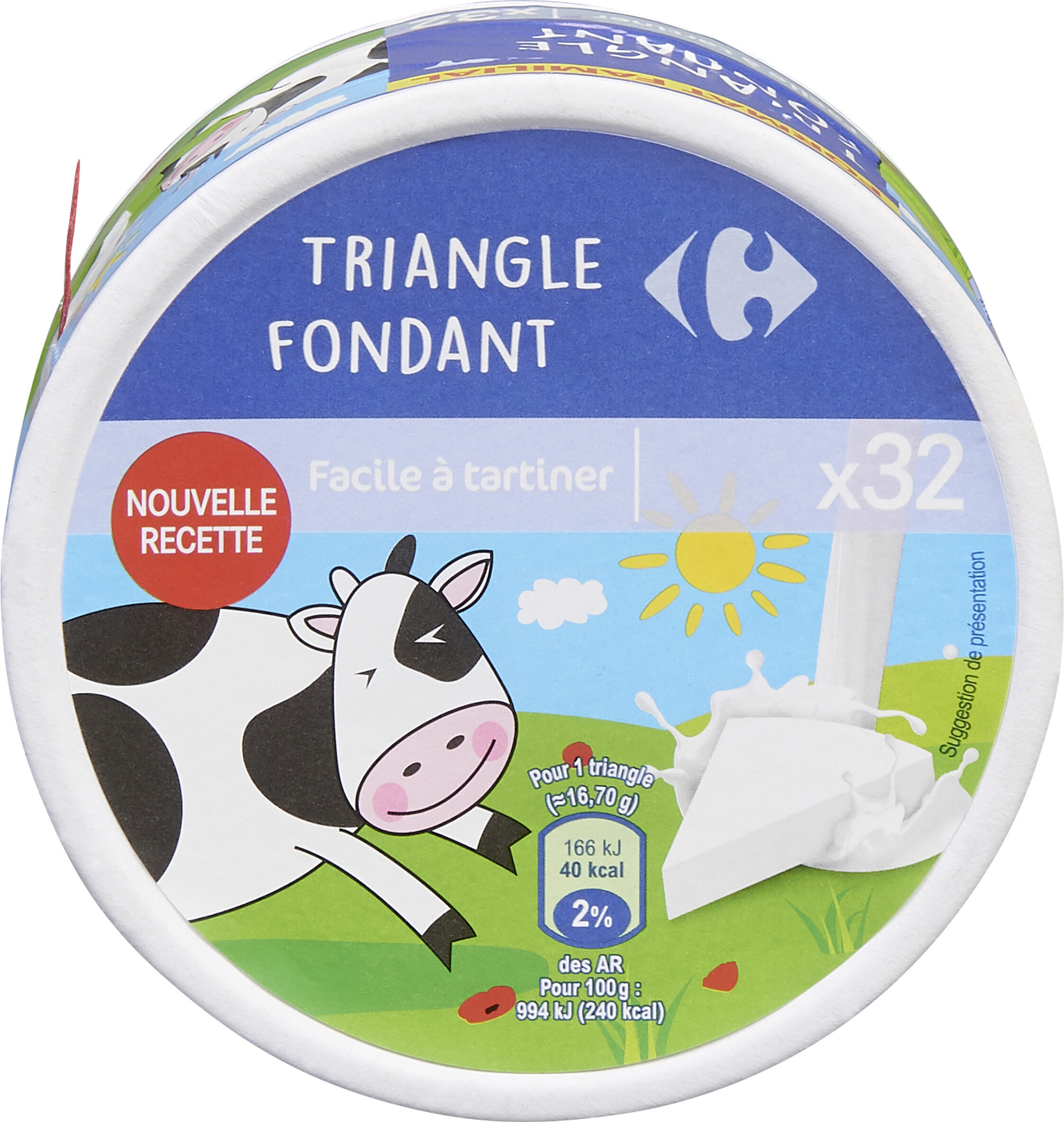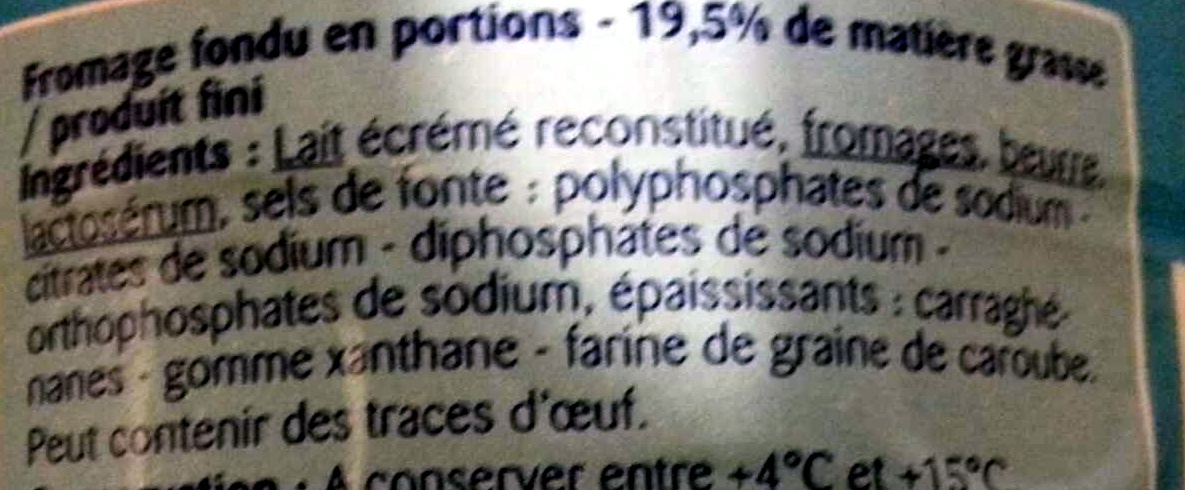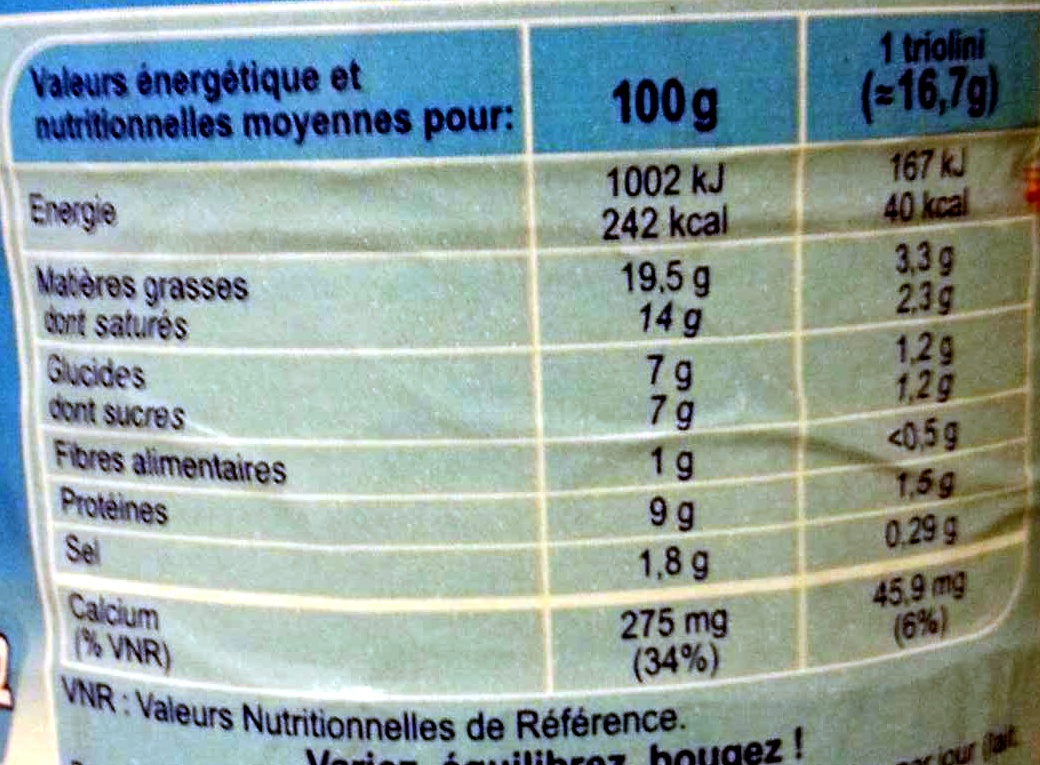Help us make food transparency the norm!
As a non-profit organization, we depend on your donations to continue informing consumers around the world about what they eat.
The food revolution starts with you!
Le triangle - Carrefour Kids - 533 g
Le triangle - Carrefour Kids - 533 g
This product page is not complete. You can help to complete it by editing it and adding more data from the photos we have, or by taking more photos using the app for Android or iPhone/iPad. Thank you!
×
Some of the data for this product has been provided directly by the manufacturer Carrefour.
Barcode: 3560070799244 (EAN / EAN-13)
Common name: Fromage fondu en portions.
Quantity: 533 g
Packaging: Metal, Recyclable Metals, Aluminium, Box, Cardboard, Fresh
Brands: Carrefour Kids, CMI (Carrefour Marchandises Internationales), Groupe Carrefour, Carrefour
Categories: Dairies, Fermented foods, Fermented milk products, Cheeses, Spreads, Salted spreads, Cow cheeses, Fresh foods, French cheeses, Processed cheese, Cheese spreads, Industrial cheese
Labels, certifications, awards:
Green Dot, Made in France, New recipe, fr:Eco-Emballages
Producer: Fabriqué par EMB 39300F pour Interdis
Manufacturing or processing places: Société Fromagère de Lons-le-Saunier (Filiale Groupe Lactalis) - 39 Avenue Camille Prost - 39000 Lons-le-Saunier, Jura, Franche-Comté, France
Traceability code: FR 39.300.002 CE - Lons-le-Saunier (Jura, France), EMB 39300F - Lons-le-Saunier (Jura, France)
Stores: Carrefour, carrefour.fr
Countries where sold: France
Matching with your preferences
Health
Ingredients
-
17 ingredients
: Lait écrémé reconstitué (origine France), fromages (Lait origine UE), eau, beurre (Lait origine UE), poudre et/ou concentré de lactosérum, sel de fonte: citrates de sodium, épaississants: carraghénanes et phosphate de diamidon hydroxypropylé, correcteur d'acidité: acide citrique, vitamines A, riboflavine (vitamine B2), vitamine B12 (contient lait).Allergens: Eggs, MilkTraces: Eggs
Food processing
-
Ultra processed foods
Elements that indicate the product is in the 4 - Ultra processed food and drink products group:
- Additive: E1442 - Hydroxypropyl distarch phosphate
- Additive: E407 - Carrageenan
- Ingredient: Thickener
Food products are classified into 4 groups according to their degree of processing:
- Unprocessed or minimally processed foods
- Processed culinary ingredients
- Processed foods
- Ultra processed foods
The determination of the group is based on the category of the product and on the ingredients it contains.
Additives
-
E1442 - Hydroxypropyl distarch phosphate
Hydroxypropyl distarch phosphate: Hydroxypropyl distarch phosphate -HDP- is a modified resistant starch. It is currently used as a food additive -INS number 1442-. It is approved for use in the European Union -listed as E1442-, the United States, Australia, Taiwan, and New Zealand.Source: Wikipedia
-
E330 - Citric acid
Citric acid is a natural organic acid found in citrus fruits such as lemons, oranges, and limes.
It is widely used in the food industry as a flavor enhancer, acidulant, and preservative due to its tart and refreshing taste.
Citric acid is safe for consumption when used in moderation and is considered a generally recognized as safe (GRAS) food additive by regulatory agencies worldwide.
-
E331 - Sodium citrates
Sodium citrate: Sodium citrate may refer to any of the sodium salts of citrate -though most commonly the third-: Monosodium citrate Disodium citrate Trisodium citrateThe three forms of the salt are collectively known by the E number E331. Sodium citrates are used as acidity regulators in food and drinks, and also as emulsifiers for oils. They enable cheeses to melt without becoming greasy.Source: Wikipedia
-
E407 - Carrageenan
Carrageenan (E407), derived from red seaweed, is widely employed in the food industry as a gelling, thickening, and stabilizing agent, notably in dairy and meat products.
It can exist in various forms, each imparting distinct textural properties to food.
However, its degraded form, often referred to as poligeenan, has raised health concerns due to its potential inflammatory effects and its classification as a possible human carcinogen (Group 2B) by the International Agency for Research on Cancer (IARC).
Nevertheless, food-grade carrageenan has been deemed safe by various regulatory bodies when consumed in amounts typically found in food.
Ingredients analysis
-
Palm oil free
No ingredients containing palm oil detected
Unrecognized ingredients: fr:poudre-et-concentre-de-lactoserumSome ingredients could not be recognized.
We need your help!
You can help us recognize more ingredients and better analyze the list of ingredients for this product and others:
- Edit this product page to correct spelling mistakes in the ingredients list, and/or to remove ingredients in other languages and sentences that are not related to the ingredients.
- Add new entries, synonyms or translations to our multilingual lists of ingredients, ingredient processing methods, and labels.
If you would like to help, join the #ingredients channel on our Slack discussion space and/or learn about ingredients analysis on our wiki. Thank you!
-
Non-vegan
Non-vegan ingredients: fr:Lait écrémé reconstitué, Cheese, ButterSome ingredients could not be recognized.
We need your help!
You can help us recognize more ingredients and better analyze the list of ingredients for this product and others:
- Edit this product page to correct spelling mistakes in the ingredients list, and/or to remove ingredients in other languages and sentences that are not related to the ingredients.
- Add new entries, synonyms or translations to our multilingual lists of ingredients, ingredient processing methods, and labels.
If you would like to help, join the #ingredients channel on our Slack discussion space and/or learn about ingredients analysis on our wiki. Thank you!
-
Vegetarian status unknown
Unrecognized ingredients: fr:poudre-et-concentre-de-lactoserum, Vitamin b12Some ingredients could not be recognized.
We need your help!
You can help us recognize more ingredients and better analyze the list of ingredients for this product and others:
- Edit this product page to correct spelling mistakes in the ingredients list, and/or to remove ingredients in other languages and sentences that are not related to the ingredients.
- Add new entries, synonyms or translations to our multilingual lists of ingredients, ingredient processing methods, and labels.
If you would like to help, join the #ingredients channel on our Slack discussion space and/or learn about ingredients analysis on our wiki. Thank you!
-
Details of the analysis of the ingredients
We need your help!
Some ingredients could not be recognized.
We need your help!
You can help us recognize more ingredients and better analyze the list of ingredients for this product and others:
- Edit this product page to correct spelling mistakes in the ingredients list, and/or to remove ingredients in other languages and sentences that are not related to the ingredients.
- Add new entries, synonyms or translations to our multilingual lists of ingredients, ingredient processing methods, and labels.
If you would like to help, join the #ingredients channel on our Slack discussion space and/or learn about ingredients analysis on our wiki. Thank you!
: _Lait_ écrémé reconstitué, _fromages_, eau, _beurre_, poudre et concentré de _lactosérum_, sel de fonte (citrates de sodium), épaississants (carraghénanes, phosphate de diamidon hydroxypropylé), correcteur d'acidité (acide citrique), vitamines, vitamine A, riboflavine (vitamine B2), vitamine B12- _Lait_ écrémé reconstitué -> fr:lait-ecreme-reconstitue - vegan: no - vegetarian: yes - ciqual_proxy_food_code: 19051 - percent_min: 8.33333333333333 - percent_max: 100
- _fromages_ -> en:cheese - vegan: no - vegetarian: maybe - ciqual_proxy_food_code: 12999 - percent_min: 0 - percent_max: 50
- eau -> en:water - vegan: yes - vegetarian: yes - ciqual_food_code: 18066 - percent_min: 0 - percent_max: 33.3333333333333
- _beurre_ -> en:butter - vegan: no - vegetarian: yes - ciqual_proxy_food_code: 16400 - percent_min: 0 - percent_max: 25
- poudre et concentré de _lactosérum_ -> fr:poudre-et-concentre-de-lactoserum - percent_min: 0 - percent_max: 20
- sel de fonte -> en:emulsifying-salts - percent_min: 0 - percent_max: 16.6666666666667
- citrates de sodium -> en:e331 - vegan: yes - vegetarian: yes - percent_min: 0 - percent_max: 16.6666666666667
- épaississants -> en:thickener - percent_min: 0 - percent_max: 14.2857142857143
- carraghénanes -> en:e407 - vegan: yes - vegetarian: yes - percent_min: 0 - percent_max: 14.2857142857143
- phosphate de diamidon hydroxypropylé -> en:e1442 - vegan: yes - vegetarian: yes - percent_min: 0 - percent_max: 7.14285714285714
- correcteur d'acidité -> en:acidity-regulator - percent_min: 0 - percent_max: 12.5
- acide citrique -> en:e330 - vegan: yes - vegetarian: yes - percent_min: 0 - percent_max: 12.5
- vitamines -> en:vitamins - vegan: yes - vegetarian: yes - percent_min: 0 - percent_max: 11.1111111111111
- vitamine A -> en:vitamin-a - vegan: yes - vegetarian: yes - percent_min: 0 - percent_max: 10
- riboflavine -> en:e101 - vegan: maybe - vegetarian: yes - percent_min: 0 - percent_max: 9.09090909090909
- vitamine B2 -> en:e101 - vegan: maybe - vegetarian: yes - percent_min: 0 - percent_max: 9.09090909090909
- vitamine B12 -> en:vitamin-b12 - percent_min: 0 - percent_max: 8.33333333333333
Nutrition
-
Poor nutritional quality
⚠ ️Warning: the amount of fruits, vegetables and nuts is not specified on the label, it was estimated from the list of ingredients: 0This product is not considered a beverage for the calculation of the Nutri-Score.
Positive points: 5
- Proteins: 4 / 5 (value: 7.5, rounded value: 7.5)
- Fiber: 1 / 5 (value: 1, rounded value: 1)
- Fruits, vegetables, nuts, and colza/walnut/olive oils: 0 / 5 (value: 0, rounded value: 0)
Negative points: 20
- Energy: 3 / 10 (value: 1049, rounded value: 1049)
- Sugars: 1 / 10 (value: 7, rounded value: 7)
- Saturated fat: 10 / 10 (value: 14, rounded value: 14)
- Sodium: 6 / 10 (value: 600, rounded value: 600)
The points for proteins are counted because the product is in the cheeses category.
Nutritional score: (20 - 5)
Nutri-Score:
-
Nutrient levels
-
Fat in high quantity (21%)
What you need to know- A high consumption of fat, especially saturated fats, can raise cholesterol, which increases the risk of heart diseases.
Recommendation: Limit the consumption of fat and saturated fat- Choose products with lower fat and saturated fat content.
-
Saturated fat in high quantity (14%)
What you need to know- A high consumption of fat, especially saturated fats, can raise cholesterol, which increases the risk of heart diseases.
Recommendation: Limit the consumption of fat and saturated fat- Choose products with lower fat and saturated fat content.
-
Sugars in moderate quantity (7%)
What you need to know- A high consumption of sugar can cause weight gain and tooth decay. It also augments the risk of type 2 diabetes and cardio-vascular diseases.
Recommendation: Limit the consumption of sugar and sugary drinks- Sugary drinks (such as sodas, fruit beverages, and fruit juices and nectars) should be limited as much as possible (no more than 1 glass a day).
- Choose products with lower sugar content and reduce the consumption of products with added sugars.
-
Salt in moderate quantity (1.5%)
What you need to know- A high consumption of salt (or sodium) can cause raised blood pressure, which can increase the risk of heart disease and stroke.
- Many people who have high blood pressure do not know it, as there are often no symptoms.
- Most people consume too much salt (on average 9 to 12 grams per day), around twice the recommended maximum level of intake.
Recommendation: Limit the consumption of salt and salted food- Reduce the quantity of salt used when cooking, and don't salt again at the table.
- Limit the consumption of salty snacks and choose products with lower salt content.
-
-
Nutrition facts
Nutrition facts As sold
for 100 g / 100 mlAs sold
per serving (16,7 g)Compared to: Industrial cheese Energy 1,049 kj
(253 kcal)175 kj
(42 kcal)-19% Fat 21 g 3.51 g -20% Saturated fat 14 g 2.34 g -22% Carbohydrates 8.5 g 1.42 g +490% Sugars 7 g 1.17 g +554% Fiber 1 g 0.167 g +1,102% Proteins 7.5 g 1.25 g -57% Salt 1.5 g 0.251 g +9% Calcium 275 mg 45.9 mg -51% Fruits‚ vegetables‚ nuts and rapeseed‚ walnut and olive oils (estimate from ingredients list analysis) 0 % 0 %
Environment
-
Eco-Score C - Moderate environmental impact
⚠ ️Select a country in order to include the full impact of transportation.The Eco-Score is an experimental score that summarizes the environmental impacts of food products.→ The Eco-Score was initially developped for France and it is being extended to other European countries. The Eco-Score formula is subject to change as it is regularly improved to make it more precise and better suited to each country.Life cycle analysis
-
Average impact of products of the same category: C (Score: 50/100)
Category: Processed cheese snack w breadsticks, for children
Category: Processed cheese snack w breadsticks, for children
- PEF environmental score: 0.54 (the lower the score, the lower the impact)
- including impact on climate change: 5.27 kg CO2 eq/kg of product
Stage Impact Agriculture
80.4 %Processing
11.5 %Packaging
2.9 %Transportation
3.1 %Distribution
1.7 %Consumption
0.5 %
Bonuses and maluses
-
Origins of ingredients with a high impact
Malus: 0
Environmental policy: 0
Transportation: 0
Origin of the product and/or its ingredients % of ingredients Impact France 54 %Medium European Union 29 %High Unknown 17 %High
-
Packaging with a low impact
Malus: -4
Shape Material Recycling Impact Box Heavy aluminium Recycle Medium Unknown Cardboard Low ⚠ ️ The information about the packaging of this product is not sufficiently precise (exact shapes and materials of all components of the packaging).⚠ ️ For a more precise calculation of the Eco-Score, you can modify the product page and add them.
If you are the manufacturer of this product, you can send us the information with our free platform for producers.
Eco-Score for this product
-
Impact for this product: C (Score: 46/100)
Product: Le triangle - Carrefour Kids - 533 g
Life cycle analysis score: 50
Sum of bonuses and maluses: -4
Final score: 46/100
-
Carbon footprint
-
Equal to driving 2.7 km in a petrol car
527 g CO² per 100g of product
The carbon emission figure comes from ADEME's Agribalyse database, for the category: Processed cheese snack w breadsticks, for children (Source: ADEME Agribalyse Database)
Stage Impact Agriculture
83.1 %Processing
8.5 %Packaging
3.5 %Transportation
4.1 %Distribution
0.7 %Consumption
0.1 %
Packaging
-
Packaging with a low impact
-
Packaging parts
Box (Aluminium)
(Cardboard)
-
Packaging materials
Material % Packaging weight Packaging weight per 100 g of product Paper or cardboard Metal Total
-
Transportation
-
Origins of ingredients
Origins of ingredients with a high impact
Origin of the product and/or its ingredients % of ingredients Impact France 54 %Medium European Union 29 %High Unknown 17 %High
Other information
Other information: Picto nouvelle recette Facile à tartiner x32 portions
Conservation conditions: Conservation : Pour un dégustation optimale, à consommer de préférence avant le / N° de lot : voir la date sous la boite . A conserver entre 0°C et +8°C.
Customer service: Interdis - TSA 91431 - 91343 MASSY Cedex - France
Report a problem
-
Incomplete or incorrect information?
Category, labels, ingredients, allergens, nutritional information, photos etc.
If the information does not match the information on the packaging, please complete or correct it. Open Food Facts is a collaborative database, and every contribution is useful for all.
Data sources
Product added on by jeanbono
Last edit of product page on by ecoscore-impact-estimator.
Product page also edited by carrefour, driveoff, jacob80, kiliweb, openfoodfacts-contributors, org-carrefour, packbot, quechoisir.










